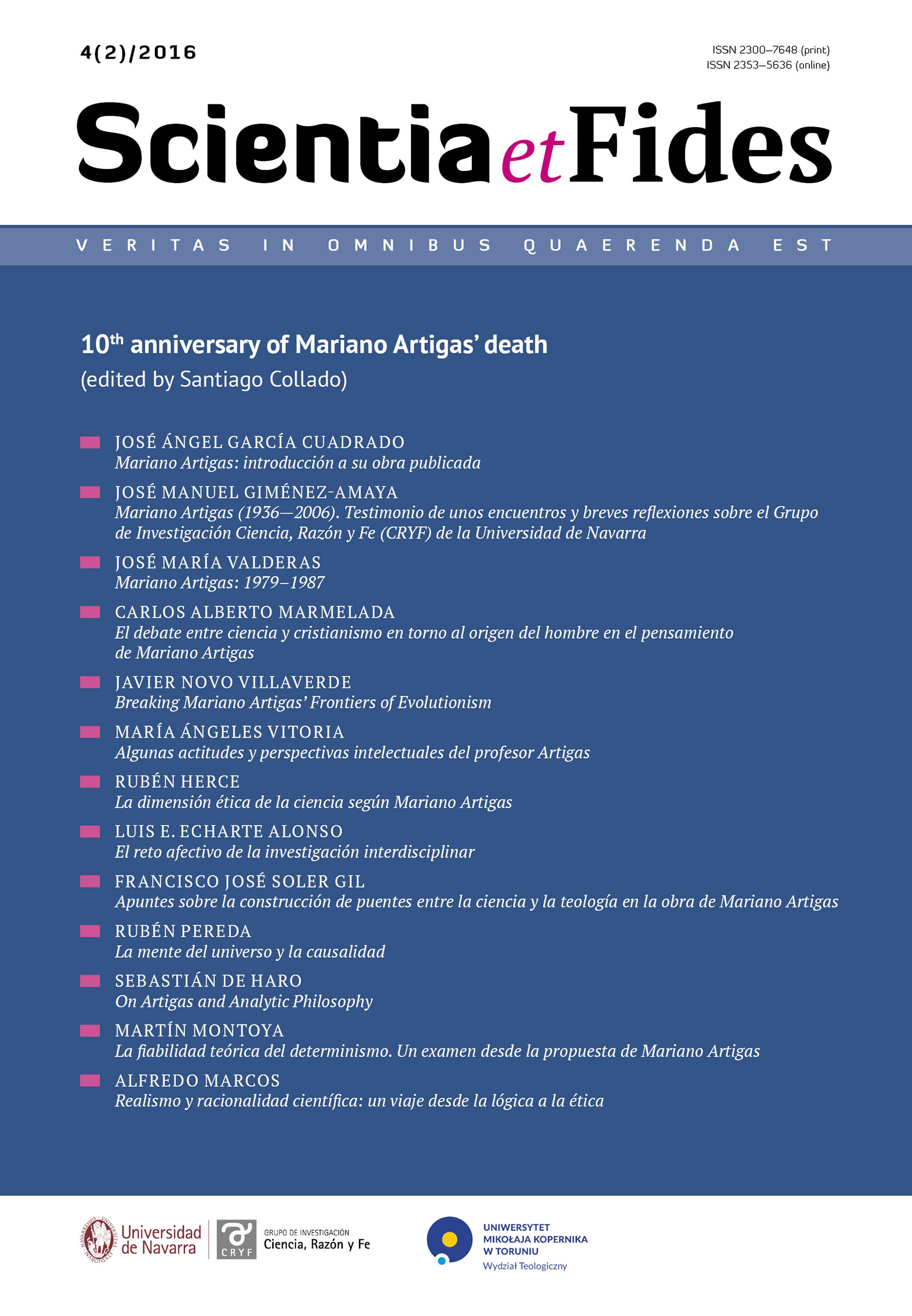Stephen Jay Gould and Karl Popper on Science and Religion
Słowa kluczowe
Stephen Jay Gould, Karl Popper, science and religion, non-overlapping magisterial, independence dialogueAbstrakt
This paper analyzes the thought on science and religion of two thinkers that share essentially the same position: Stephen Jay Gould and Karl Popper. We first make a comparison between those passages of their works where this similarity emerges more explicitly. We then recall some of the critiques that have been extended to Gould on this topic; they can be extended to Popper as well. Moreover, we highlight another critical issue—taken from evolutionary theory—that Gould’s theorization is not able to handle adequately from the theological standpoint. We finally place Gould’s proposal inside Barbour’s fourfold typology for the science-religion relationship, and we conclude by recommending further critical reflection on these interdisciplinary issues.
Bibliografia
Alexander, D. R. 2013. “The Implications of Evolutionary Biology for Religious Belief.” In The Philosophy of Biology: A Companion for Educators, edited by K. Kampourakis, 179–204. Dordrecht: Springer.
Artigas, M. 1979. Karl Popper. Búsqueda sin término. Madrid: Magisterio Español.
Artigas, M. 1998. “The Ethical Roots of Karl Popper’s Epistemology.” Acta Philosophica 7: 197–233.
Artigas, M. 1999. The Ethical Nature of Karl Popper’s Theory of Knowledge: Including Popper’s Unpublished Comments on Bartley and Critical Rationalism, edited by I. Slade. Bern: Peter Lang.
Artigas, M. 2002. “Popper Biography and Something More.” Philosophy of the Social Sciences 32: 387–401.
Artigas, M. 2005. “El cordero y el león. Ciencia y religion en Stephen Jay Gould.” Scripta Theologica 37: 141–158.
Barbour, I. G. 1998. Religion and Science: Historical and Contemporary Issues. A Revised and Expanded Edition of Religion in an Age of Science. London: SCM Press LTD.
Dennett, D. C. 2006. Breaking the Spell: Religion as a Natural Phenomenon. New York: Viking.
Giberson, K., and M. Artigas. 2007. Oracles of Science: Celebrity Scientists versus God and Religion. New York: Oxford University Press.
Gould, S. J. 1989. Wonderful Life: The Burgess Shale and the Nature of History. Cambridge MA: Harvard University Press.
Gould, S. J. 1996. Full House: The Spread of Excellence from Plato to Darwin. New York: Harmony Book.
Gould, S. J. 1997. “Nonoverlapping Magisteria.” Natural History 106:16–22.
Gould, S. J. 2002 [1999]. Rocks of Ages: Science and Religion in the Fullness of Life. New York: Ballantine Books.
Gould, S. J. 2011 [1998]. Leonardo’s Mountain of Clams and the Diet of Worms: Essays on Natural History. New York: Harmony Books. Kelley, Patricia H. 2009. “Stephen Jay Gould’s Winnowing Fork: Science, Religion, and Creationism.” In Stephen Jay Gould: Reflections on His View of Life, edited by W. D. Allmon, P. H. Kelley, and R. M. Ross, 171–188. New York: Oxford University Press.
McMullin, Ernan. 1998. “Cosmic Purpose and the Contingency of Human Evolution.” Theology Today 55: 389–414.
McMullin, Ernan. 2011. “Varieties of Methodological Naturalism.” In The Nature of Nature: Examining the Role of Naturalism in Science, edited by B. L. Gordon, and W. A. Dembski, 82–94. Wilmington DE: Isi Books.
Murray, M. J. 2009. “Science and Religion in Constructive Engagement.” In Analytic Theology: New Essays in the Philosophy of Theology, edited by O. D. Crisp, and M. C. Rea, 233–247. New York: Oxford University Press.
Orr, H. A. 1999. “Gould on God: Can Religion and Science Be Happily Reconciled?” Boston Review. Accessed May 17, 2016. http://new.bostonreview.net/BR24.5/orr.html.
Peters, T. 1998. “Science and Theology: Toward Consonance.” In Science and Theology: The New Consonance, edited by T. Peters, 11–39. Boulder CO: Westview Press.
Pievani, T. 2009. “The World after Charles R. Darwin: Continuity, Unity in Diversity, Contingency.” Rendiconti Lincei: Scienze Fisiche e Naturali 20: 355–361.
Pievani, T. 2011. La vita inaspettata. Il fascino di un’evoluzione che non ci aveva previsto. Milano: Raffaello Cortina Editore.
Pigliucci, M. 2014. “5 Questions on Science & Religion.” In Science and Religion: 5 Questions, edited by G. D. Caruso, 163–169. Copenhagen: Automatic Press / VIP.
Popper, K. 2008. After the Open Society: Selected Social and Political Writings, edited
by J. Shearmur, and P. N. Turner. New York: Routledge.
Ruse, M. 1999. “Review of Stephen Jay Gould’s “Rocks of Ages.” Accessed May 17, 2016. http://www.metanexus.net/book-review/review-stephen-jay-goulds-rocks-ages.
Ruse, M. 2010. “Atheism, Naturalism and Science: Three in One?” In The Cambridge Companion to Science and Religion, edited by P. Harrison, 229–243. New York: Cambridge University Press.
Ruse, M. 2015. Atheism: What Everyone Needs to Know®. New York: Oxford University Press. Stenmark, M. 2004. “Contemporary Darwinism and Religion.” In Darwinian Heresies, edited by A. Lustig, R. J. Richards, and M. Ruse, 173–191. New York: Cambridge University Press.
Ruse, M. 2004. How to Relate Science and Religion: A Multidimensional Model. Grand Rapids MI: William B. Eerdmans Publishing Company.
Stoeger, W. R. 2013. “Ernan McMullin on Contingency, Cosmic Purpose, and the Atemporality of the Creator.” Zygon: Journal of Religion and Science 48: 329–337.
Pobrania
Opublikowane
Jak cytować
Numer
Dział
Licencja
CC BY ND 4.0. Posiadaczem prawa autorskiego (Licencjodawcą) jest Autor, który na mocy umowy licencyjnej udziela nieodpłatnie prawa do eksploatacji dzieła na polach wskazanych w umowie.
- Licencjodawca udziela Licencjobiorcy licencji niewyłącznej na korzystanie z Utworu/przedmiotu prawa pokrewnego w następujących polach eksploatacji: a) utrwalanie Utworu/przedmiotu prawa pokrewnego; b) reprodukowanie (zwielokrotnienie) Utworu/przedmiotu prawa pokrewnego drukiem i techniką cyfrową (e-book, audiobook); c) wprowadzania do obrotu egzemplarzy zwielokrotnionego Utworu/przedmiotu prawa pokrewnego; d) wprowadzenie Utworu/przedmiotu prawa pokrewnego do pamięci komputera; e) rozpowszechnianie utworu w wersji elektronicznej w formule open access na licencji Creative Commons (CC BY-ND 3.0) poprzez platformę cyfrową Wydawnictwa Naukowego UMK oraz repozytorium UMK.
- Korzystanie przez Licencjobiorcę z utrwalonego Utworu ww. polach nie jest ograniczone czasowo ilościowo i terytorialnie.
- Licencjodawca udziela Licencjobiorcy licencji do Utworu/przedmiotu prawa pokrewnego nieodpłatnie na czas nieokreślony
PEŁEN TEKST UMOWY LICENCYJNEJ >>
Statystyki
Liczba wyświetleń i pobrań: 1048
Liczba cytowań: 0



